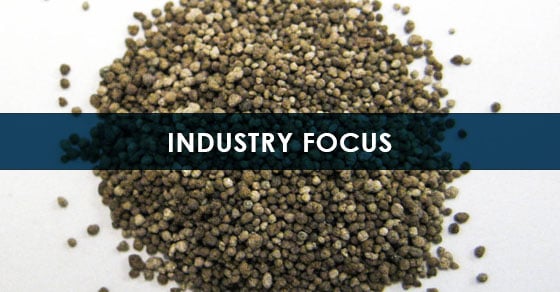The US roofing market continues to see healthy growth, with a number of agencies anticipating this trend to continue in the coming years, particularly for the asphalt shingles segment.
This trend is bolstering another sub-segment of the industry: roofing granules – a key contributor to asphalt shingle quality and lifespan. Not only is demand for roofing granules growing, but the level of quality required from these granules is on the rise as well.
Factors Influencing the Roofing Market
There are a number of circumstances playing into the growth of the US roofing market and the demand for higher-quality products, many of which apply globally as well:
Homes Are Aging
The nation’s housing stock is aging, prompting a wave of renovations and re-roofing projects. According to Realtor Magazine, 80 percent of the nation’s housing stock exceeds 20 years of age; 40 percent is older than 50 years.
With asphalt shingles ranging anywhere from 15 to 30 years of life depending on the type, many of the country’s aging asphalt roofs are reaching or have exceeded their expected lifespan, representing a big opportunity for the industry.
Further, many of these aging roofs were installed when three-tab shingles were the industry standard. This style has since fallen out of favor in lieu of more durable laminated shingle products. As three-tab shingles age, they are especially susceptible to weather-related damage, putting homeowners at an increased risk and causing many to make the switch to laminated shingles.
Extreme Weather Events on the Rise
The rise in extreme weather events is also a major driver for the roofing industry. Hurricanes, floods, and wildfires cost the US a record $306 billion in 2017. In recent years, it seems both severity and frequency of weather events have escalated, leaving homeowners around the nation in need of roof repair or more likely, replacement.
Insurance Requirements
The trend in extreme weather, along with other factors, is also pushing demand for re-roofing projects; in an effort to limit liability, insurers are increasingly making homeowner policies contingent on roof replacement, even in cases where roofs are not yet worn.
Housing Market Up
The US housing market has been growing strong in recent years, with new housing starts (and subsequently roofing requirements) on the rise as millenials venture into home ownership and less populated areas of the country see growth (among other factors).
Single-family homes especially bolster the asphalt shingle industry, as they boast more roof area per-unit than any other type of residence.
Emphasis on Better Roofing Products
Consumers, and in some cases regulators, are also increasingly demanding roofing products that not only offer more durability, but also greater energy efficiency and other performance benefits, with many building codes becoming more stringent. Reflective granules, which reduce energy requirements in homes by enhancing solar reflectivity, for example, are becoming more common and are now even required under Title 24 in California.
Increasing aesthetic requirements for asphalt shingles are also driving demand for higher-quality products.
How Roofing Granules Influence Asphalt Shingles
A significant component in the quality, durability, and appearance of asphalt shingles, the granules used in roofing serve several purposes. In addition to contributing to the roof’s overall appearance, granules are tasked with protecting the roof from the elements, reducing the effects of impact, and providing resistance to fire. These critical tasks make roofing granule quality essential, the criteria for which has tightened significantly in recent decades.
The qualifications required for roofing granules, in fact, are such that they cannot be categorized by any one ore type, but rather, are dependent on the physical and chemical attributes of a given deposit. Mineral types that often fit these requirements include:
- Basalt
- Dorite
- Porphyry
- Andesite
- Argillite
- Granite
- Nepheline Syenite
- Rhyolite
- Diabase
- Greenstone
- Arbosic Quartzite
The defined physical and chemical specifications for roofing granules ensure that the material meets a variety of criteria essential for use as a roofing material. These specifications center around:¹,²
Resistance to Weathering
Granules are tasked with protecting the asphalt shingle, and as such, must be highly resistant to both chemical and physical weathering such as leaching, freezing and thawing, oxidation, wet/dry cycling, and more.
Adequate Surface for Coloring
Since part of the aesthetic and effectiveness to roofing granules lies in their coating, the chosen mineral must exhibit a surface that will accept and maintain the coloring, while promoting a strong bond between the coating and mineral.
Uniformity
The mineral must be uniform in quality, color, and physical specifications.
Low Porosity
The mineral must exhibit a porosity which is physically strong and discourages the seepage of water into the asphalt shingle.
Opaque Quality
Despite being under constant exposure to the sun, minerals must not allow UV light to pass through to the asphalt, as this will quickly degrade the shingle.
Toughness
Granules must be rigid enough to withstand handling and promote minimal attrition. They must also be capable of tolerating the high firing temperatures used to cure the coating onto the granule.
Equidimensional Fracturing
Upon crushing, the chosen mineral should fracture cubically to avoid the appearance of color differences and to prevent directional embedment in the shingle.
These specifications, along with many others, provide asphalt shingles with the qualities needed to perform their duty reliably.
Roofing Granule Production
The roofing industry requires consistent and reliable processing. Additionally, production equipment such as rotary drum pre-heaters, coloring drums, kilns, coolers, and more must be built to handle the aggressive qualities that make roofing granules so effective in their application.
Equipment for processing roofing granules must be constructed of heavy-duty materials capable of discouraging abrasion while effectively processing the material to meet the intended objectives.
Conclusion
As extreme weather events, aging housing stock, and increasing regulation continue to increase the demand for asphalt shingles, quality roofing granules will remain a critical component in meeting the many requirements of today’s roofing industry, from desired aesthetic to high performance resistance against the elements.
FEECO is the industry’s preferred provider for roofing granule production equipment, from a single piece, to the entire production line. Our rotary dryers, coolers, kilns, and coloring drums are designed around the specific demands of processing roofing granules for reliable long-term production. We also offer a batch and pilot testing facility where we can work with clients at a variety of levels in the R&D stages, as well as a Customer Service Team that can inspect and maintain all equipment. For more information on our custom roofing granule production equipment, or other services to the industry, contact us today!
View the roofing granule production line project profile >>
- https://books.google.com/books?id=0940AQAAMAAJ&pg=PR8&lpg=PR8&dq=roofing+granule+manufacturing+process+flow+diagram&source=bl&ots=UB5otOPhZs&sig=ACfU3U1aFrksEsM7dGOa0nl2VJFP_B-DNg&hl=en&sa=X&ved=2ahUKEwj-jY2Uo_nmAhWCXM0KHeWYARIQ6AEwGHoECA0QAQ#v=onepage&q=roofing&f=false
- https://www.osti.gov/servlets/purl/860887


